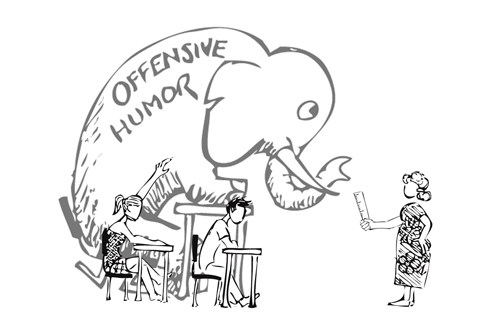
When marching band returned from its retreat earlier this month, most students were still thinking about the Skit Night jokes that had become so distasteful. Some were trying to keep the story hushed up, while others were unsure as to why the humor was so offensive in the first place.
However inappropriate the skits may have been, most students can relate to a situation when a joke inadvertently became offensive. The band camp incident serves as a reminder for the entire student body that from time to time, humor can quickly go from funny to inappropriate and that the line between the two territories is easy to miss.
Even though students often cross the line without malicious intent, those involved must have an open discussion when they do cross it.
Without addressing how the line was crossed and what specifically was offensive, it is impossible to move beyond that uncomfortable moment. Even if it might be uncomfortable to talk about, pretending that nothing wrong happened implicitly excuses the action, meaning that people will continue to act as they did. Those who cannot figure out what went wrong will not be able to act differently in the future.
Marching band has taken the right steps by bringing a motivational speaker to address the band students but needs to go farther in discussing the specific offenses of Skit Night. Moving on does not mean pretending that the issue never happened, although such pretense might be easier than tackling the underlying issues.
The school is the ideal environment to have safe conversations, and students and teachers need to work together and enable the involved parties to express their feelings and apologize if necessary.
Having open discussions about how certain words and humor might be offensive allows students to more clearly see the line that was crossed, even if it might be crossed again in the future. After all, the line is not always obvious. Rarely does it appear as an octagonal red sign with the word “STOP” printed across it.
As people, we all will offend others from time to time, even if we do so accidentally. Having a sense of where to stop can help ensure that we don’t cross the line. Discussing offensive humor is the only way to improve that sense for where to stop and subsequently minimize future offenses; simply ignoring it is not a viable option.







MiddleB | Sep 30, 2009 at 8:05 pm
dido
HighB | Sep 29, 2009 at 10:59 pm
You are awesome Blue!!!
:D | Sep 29, 2009 at 6:22 pm
You rock Blue!
LowB | Sep 28, 2009 at 10:23 pm
Blue we love you forever:]
piccillo | Sep 28, 2009 at 7:34 pm
we love you blue
Alex Blue | Sep 27, 2009 at 12:39 pm
This editorial is not fact-based…it is opinion-based. Here are the facts:
“Some were trying to keep the story hushed up…”
– The story was not being kept “hushed-up”. It was simply not being announced through a megaphone to the campus. Part of that was because the actual internal issue was no one’s business but the parties involved; the other reason was because we know that media outlets have a tendency to sensationalize the news for the sake of reader entertainment (case in point: this editorial). Which sounds better: “Not speaking publicly about the story” or “Keeping the story hushed up”?
“Marching band has taken the right steps by bringing a motivational speaker to address the band students but needs to go farther in discussing the specific offenses of Skit Night.”
– Actually, Scott Lang’s appearance at LAHS was purely coincidental in terms of timing with the band camp incident. Mr. Ferrucci had planned on having a mid-season check-up with the leadership staff and other band members that wished to attend. He was not brought in for the specific purpose of remedying the racial joke issue. In fact, he only talked about it indirectly, and only for about 5 minutes of his two-hour talk. Also, if you were an actual member of the band and weren’t getting your information second-hand at best, you would be aware of all of the talks that have occurred with the band to make them aware of the specific offense committed. The members are aware of what they did, and have gone to great lengths to try to apologize and make it up to me.
“Moving on does not mean pretending that the issue never happened, although such pretense might be easier than tackling the underlying issues.”
– Again with the sensationalist language? This quote directly follows the line about marching band bringing in a speaker, so it infers that the band is guilty of pretending nothing happened and avoiding the issue. I don’t know of a single band or staff member trying to “pretend that the issue never happened”. When I spoke with a few members of the leadership staff in private, we all agreed that the issue would be completely impossible to forget! There’s no way any of us can pretend it never happened. We chose to dive in and tackle the issue so that we could work through it, not tuck it away in the corners of our mind. The way you wrote this makes us seem cowardly; I will assure you, nothing could be more false.
As a band organization, we have been taking the steps necessary to mend the situation and move forward.
As the individual personally offended by the skit, I have been trying my hardest to get back to a level of comfort around the students so that I can do my job well again. Printing a tabloid-style editorial does nothing to help the situation at all.
I knew the editorial would be like this, and that’s precisely why I didn’t want there to be one.
-Alex Blue